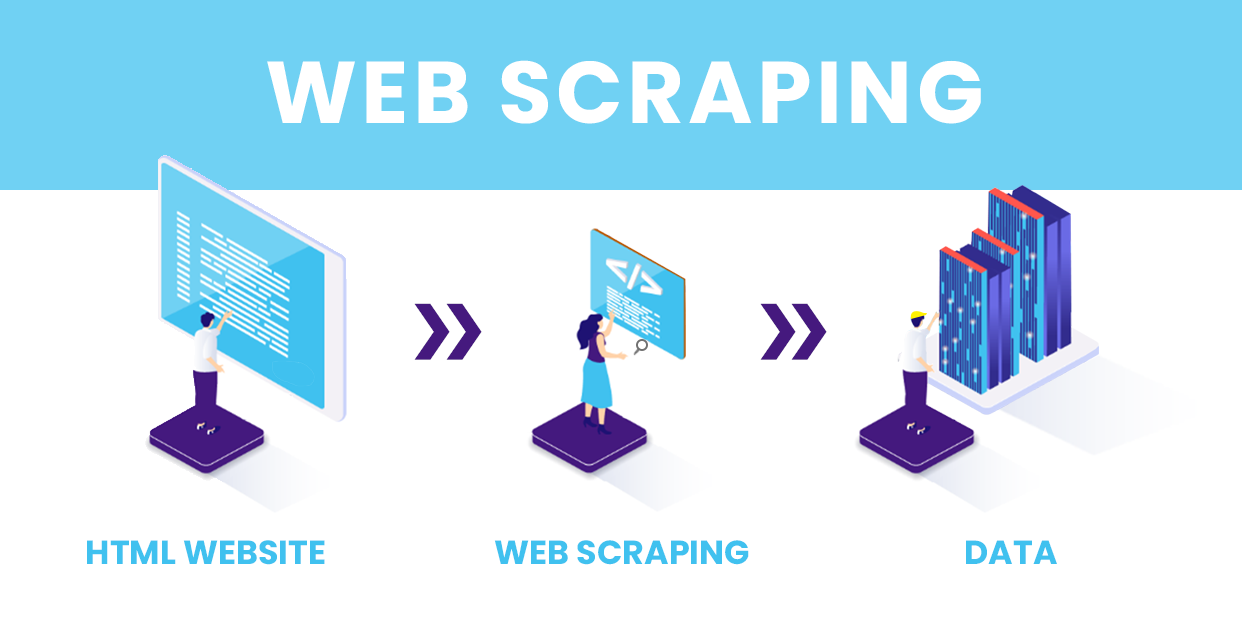What is Web Scraping and What is its Function?

In this age of information overload, businesses and individuals are constantly seeking ways to gather and utilize data efficiently. One method that has gained popularity in recent years is web scraping. But what exactly is web scraping, and what is its function?
What is web scraping?
Web scraping, also known as web data extraction, is the process of automatically collecting information from websites. Typically, this process is automated using scrapers, which are tools designed to efficiently extract data from web pages. This data is then exported into user-friendly formats such as spreadsheets or APIs. While manual web scraping is possible, automated scrapers are generally preferred for their cost-effectiveness and speed. However, web scraping can be complex due to the diverse structures of websites, leading to a variety of scrapers with different functionalities and features.
How do web scrapers work?

The web scraper starts by loading one or more URLs and then fetching the entire HTML code for the page. More advanced scrapers will render the website, including CSS and Javascript elements. Next, it extracts all the data on the page or specific data the user has chosen. Finally, the web scraper outputs the collected data in a user-friendly format, often a CSV or Excel spreadsheet, with more advanced scrapers supporting formats like JSON for API use.
Is web scraping legal?
Web scraping is legal in many cases, but there are some important considerations and legal boundaries to be aware of. Web Scraping can be legal if you use it to scrape public websites that do not explicitly prohibit scraping in their terms of service. However scraping private or sensitive information, such as personal data or copyrighted material, may be illegal. Reviewing the website's terms of service to ensure that your scraping activities comply with relevant laws and regulations is important.
What are its functions?
-
Data Extraction
The primary function of web scrapers is to navigate websites, locate specific information, and extract it in a structured format, which can include text, images, product details, prices, and other data.
-
Data Aggregation
Web scrapers compile data from various sources into a single database or file, simplifying the analysis of comprehensive datasets.
-
SEO Optimization
Search engine bots crawl a website, analyze its content, and then determine its ranking.
-
Price Comparison
Price comparison websites use bots to fetch prices and product descriptions from affiliated seller websites automatically.
-
Market Research
Market research firms use scrapers to gather data from forums and social media platforms, such as for conducting sentiment analysis.
Now that you understand the basics of web scraping and its importance, let's explore how the MrScraper tool can transform your data extraction needs. It effortlessly gathers and organizes data from diverse websites, offering valuable insights and saving time and effort. After all, it is all about what you can do with the data you’ve collected and how valuable you can make it.
Table of Contents
Take a Taste of Easy Scraping!
Get started now!
Step up your web scraping
Find more insights here

How to Get Real Estate Listings: Scraping Zillow Austin
Discover how to scrape Zillow Austin data effortlessly with tools like MrScraper. Whether you're a real estate investor, agent, or buyer, learn how to analyze property trends, uncover deeper insights, and make smarter decisions in Austin’s booming real estate market.

How to Scrape Remote Careers from We Work Remotely: A Step-By-Step Guide
Discover how to simplify your remote job search with MrScraper’s ScrapeGPT. Learn step-by-step how to scrape job postings from We Work Remotely and save time finding your dream remote career.

How to Find Best Paying Remote Jobs Using MrScraper
Learn how to find the best paying remote jobs with MrScraper. This guide shows you how to scrape top job listings from We Work Remotely efficiently and save time.


@MrScraper_
@MrScraper